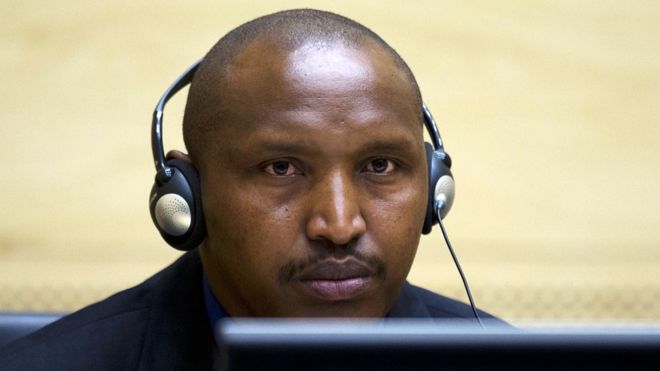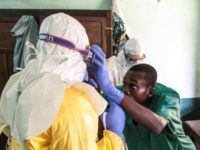
Bosco Ntaganda was convicted of leading a brutal campaign in eastern DR Congo
A former Congolese rebel leader has been found guilty of war crimes and crimes against humanity.
Fighters loyal to Bosco Ntaganda carried out gruesome massacres of civilians, said judges at the International Criminal Court (ICC).
Ntaganda, nicknamed “Terminator”, was convicted on 18 counts including murder, rape, sexual slavery and using child soldiers.
He becomes the first person convicted of sexual slavery by the ICC.
Warning: This story contains details some readers might find disturbing
Ntaganda, who will be sentenced at a later hearing, is the fourth person convicted by the ICC since its creation in 2002. He has 30 days to appeal against the convictions.
The 46-year-old former rebel has been involved in numerous armed conflicts in both Rwanda and the Democratic Republic of Congo.
Who is Bosco Ntaganda?
- Born in 1973, grew up in Rwanda
- Fled to DR Congo as a teenager after attacks on fellow ethnic Tutsis
- At 17, he began his fighting days – alternating between being a rebel and a soldier, in both Rwanda and DR Congo
- 2002-3: Militia leader in Congolese region of Ituri
- 2006: Indicted by the ICC for allegedly recruiting child soldiers in Ituri
- In charge of troops who carried out 2008 Kiwanji massacre of 150 people
- 2009: Integrated into Congolese national army and made a general
- 2012: Defects from the army, sparking a new rebellion which forces 800,000 from their homes
- 2013: Surrenders to US embassy in Kigali, Rwanda, after splits in his rebel group
What did he do?
A three-judge bench found Ntaganda guilty on all 18 counts of war crimes and crimes against humanity committed in the mineral-rich north-eastern region of Ituri between 2002 and 2003.
Ntaganda was a “key leader” who gave orders to “target and kill civilians” judge Robert Fremr said in the ruling.
Prosecutors had said Ntaganda was key in planning and running operations for the Union of Congolese Patriots (UCP) rebels and its military wing, the Patriotic Forces for the Liberation of Congo (FPLC).
The armed group conducted attacks against people perceived not to belong to the Hema ethnic group, the ICC found.
In one attack, fighters killed 49 captured people in a banana field behind a village using “sticks and batons as well as knives and machetes”.
“Men, women and children and babies were found in the field. Some bodies were found naked, some had hands tied up, some had their heads crushed. Several bodies were disembowelled or otherwise mutilated,” Judge Fremr said.
Violence in the region has killed more than 60,000 people in the region since 1999, as militias battle each other for control of scarce mineral resources, rights groups say.
Media captionWatch the 2013 BBC Newsday report of Bosco Ntaganda handing himself in
The judges ruled that Ntaganda had personally killed a Catholic priest, while the fighters he commanded ran rampage in the region.
The crimes took place when Ntaganda served as the deputy chief of general staff of Thomas Lubanga – who was the leader of the UCP. He was the first person to be convicted by the ICC in 2012 and sentenced to 14 years.
All of those convicted so far by the ICC are from Africa. A fifth person, Jean-Pierre Bemba, the former vice-president of DR Congo, was initially found guilty of war crimes before being cleared on appeal last year.
The International Federation for Human Rights (known by its French acronym FIDH) called Monday’s judgment a day of victory for Ntaganda’s victims and a day of hope for others.
But it added in a statement: “While Ntaganda’s conviction is a milestone… and a victory for all those who pursued justice for crimes committed in Ituri, several suspected criminals still enjoy impunity.”
Forty-nine mutilated bodies strewn in a banana field. A pregnant woman killed while trying to shield herself from rape. Children under the age of 15 conscripted to fight – women and girls kept as sex slaves.
In court, judges highlighted the horror brought by Bosco Ntaganda’s rebel forces before finding the 46-year-old guilty of all 18 charges.
More than 2,000 survivors were cleared to take part in this trial. Human rights groups said this judgment provided an important measure of justice.
If the guilty verdict is upheld, the next question for the judges will be how long Ntaganda should spend behind bars, and what compensation, if any, should be awarded to the survivors, many of whom risked their lives to provide evidence in this trial, and now hope the court will offer tangible reparations to help them rebuild their lives.
What is Ntaganda’s background?
Ntaganda fought under the command of Rwanda Patriotic Front (RPF) leader, now Rwandan president, Paul Kagame to end the 1994 genocide against his ethnic group – the Tutsi.
After Rwanda’s unrest spilled over into neighbouring DR Congo, he started to flip between fighting rebellions and serving in national armies – both Rwandan and Congolese.
In 2012, he became the founding member of the M23 rebel group after he defected with hundreds of soldiers from the Congolese national army.
His fighters later took over DR Congo’s eastern city of Goma before agreeing to withdraw. At least 800,000 people reportedly fled their homes.
The M23 rebel group was eventually defeated by Congolese government forces in 2013.
What do you think about this piece? Share your comment in the comment thread and share the story using the social media buttons above. You may reach the editor on 0249579664. Thank you.
